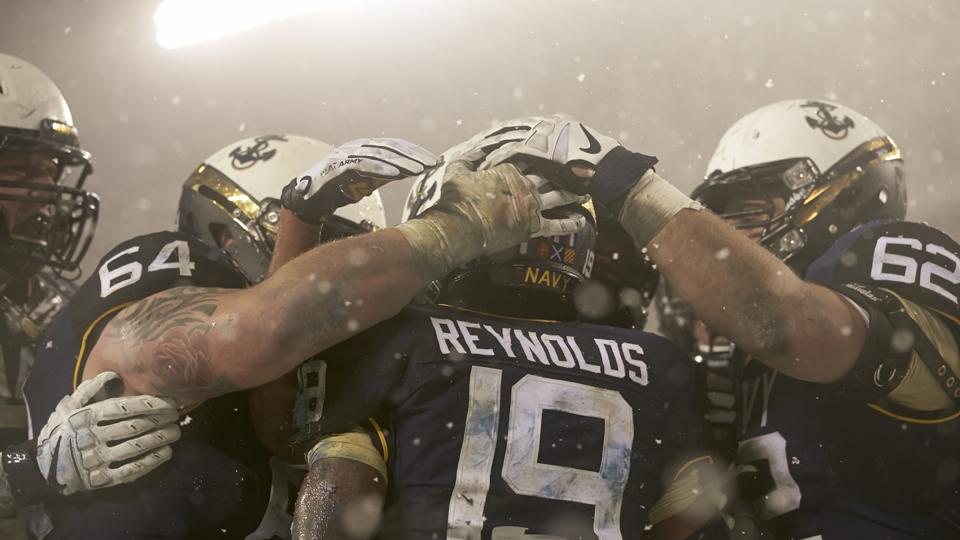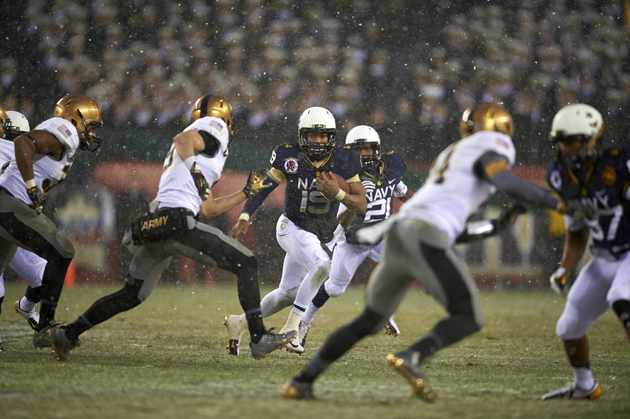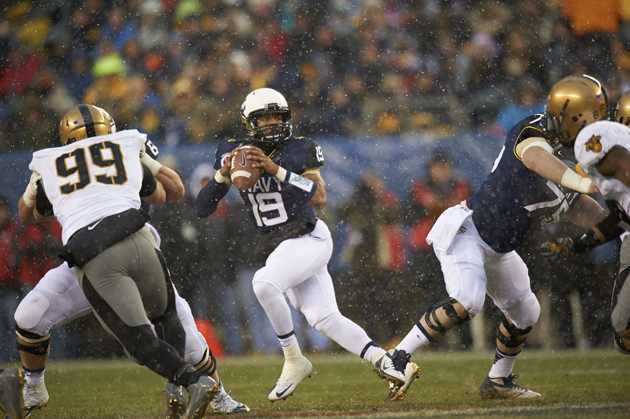
Can Heisman Hopeful Keenan Reynolds Take Navy Football Further?
Last week, while most of the nation's top college quarterbacks were surely getting in some early reps with their receiving corps, working on speed, agility and endurance, breaking down film with their coaches, maybe even watching Jon Gruden's critiques of their quarterbacking brethren on TV, Navy's Keenan Reynolds was, basically, on tour.
He was in Norfolk, Va., for three days, training with a couple of aviation squadrons. Flying in some helicopters and jets. Then it was off to Quantico, Va., to experience a little Marine Corps training, participate in some drills, observe the "lifestyle" for a couple of days. After that, following a 3 a.m. wakeup call, Reynolds was on his way to Kings Bay, Ga., to get on a submarine, and then a naval ship.
Basically, it was a crash course for Reynolds, who will be a junior at Annapolis this fall. Most Midshipmen entering their third year at the Naval Academy spend a week on each platform, but the football players do it all in a little less than two weeks.
"A unique experience," said Reynolds, a 5-11, 195-lb speedster who set an NCAA college football record for rushing touchdowns by a quarterback last fall when he ran for 31 TDs. "A lot of travel. I saw lot of different cultures and communities in a short period of time. A whirlwind, but I was able to see what the Navy is, in a nutshell."

The speedy QB from Navy set a new NCAA college football record for rushing touchdowns by a quarterback last fall when he ran for 31 TDs, leading the Midshipmen to a 9-4 record.
Al Tielemans/Sports Illustrated
Reynolds, who accepted his appointment to the Naval Academy with an eye toward a career as an aviator, said the time spend in Norfolk did not change his mind.
"It was my first time flying in a military aircraft," Reynolds said. "It was quite an experience and I thoroughly enjoyed it. For so long you see military planes flying overhead and you wonder what it would be like. Even though these planes weren't the fast movers everyone thinks about, there's a lot to it. Listening to the pilots talk about safety. Listening to the parachute riggers talk about how to put your gear on. It's a process I'd never seen. If this is what awaits me, I know it's hard work. I hope I'm ready."
STAPLES: As System Changes, Coaches and ADs Must Adjust to Rules
Meanwhile, back on campus, Navy's coaches sat back and wondered if Reynolds and the other Midshipmen on tour would be coming back to Annapolis ready to play football. It's not a new question at Navy, or Army or the Air Force. It's just part of the deal.
"What I've tried to embrace is, with all that's on their plates, our kids are just tougher," says Navy coach Ken Niumatalolo. "In the college football world, we cater so much to athletes. Tell them, 'You get this and that.' And here, our kids are trying to juggle all these things, sports, school and military. I look at it and think sometimes it's not fair. But these guys are going to be doing some tough things. This is only going to make them mentally tougher. I think that helps us on the football field. Guys will always be bigger and stronger and faster than us. So hopefully we have a mental edge on them. Hopefully our guys look at football and think, I'm going to have to deal with things harder than this."
The football teams at the service academies are filled with mind-over-matter players, says Georgia Tech coach Paul Johnson, who was the head coach at Navy from 2002-2007.
"I loved my time at Navy and have the utmost respect for the young men who go there to play football," said Johnson. "I loved coaching them because they were blue collar, they played with a chip on their shoulder and you never had to coach effort. [The players] are very team-oriented and [they] feel that Naval Academy bond from the time they are plebes. When they go through that first summer, which is very hard, the survivors bond together. That's the fabric of the academy, not just the football team. They teach teamwork. What develops is an 'us versus them' mentality. And they can use it whenever they want."

The last Midshipmen to win the Heisman was Roger Staubach in 1963. Reynolds will try to keep his name in the conversation this season as he begins his junior year at Navy.
Al Tielemans/Sports Illustrated
Reynolds, a political science major with over a 3.0 grade point average last semester, Niumatalolo agrees with Johnson, saying the rigors of the academy are nothing but fuel for the quarterback's fire.
"Keenan is a guy who is constantly grinding mentally," the coach says. "So, even when he's got a heavy workload, or away like he was to begin the summer, I know he's a kid who's doing some film work on his iPhone or his laptop. Or he's jotting down notes on a piece of paper during his free time, when he has some time to think about football."
MORE: Sweat Mecca: The Oregon Ducks' High-Tech Performance Center
While there's a clear-cut Heisman favorite in Florida State quarterback Jameis Winston, who became the first freshman to win the award a year ago, it's not outlandish to believe Reynolds could find himself sitting in New York as a finalist next December, if he keeps doing what he's been doing. The last Midshipmen to win the Heisman was Roger Staubach in 1963.
"I've watched him play a lot," says Johnson. "I saw him in high school and, looking at him now, we certainly missed on him at Georgia Tech. He's a really great player."
If Reynolds is in contention for the Heisman, that alone will be a great story. No, Navy won't be contending for a BCS Bowl, but make no mistake, they play big boy football. This year, Navy opens with Ohio State on August 30. On November 1, they play Notre Dame, a team they battled until the end last season, before losing 38-34 in South Bend. They compete with the schools that send players straight into the NFL. They compete with players who will go straight into the Navy or Marines Corps when they graduate. So, in the big picture, missing a week of summer training is not a big deal.
"Our mandated training, so it sets us back a little bit," said Reynolds. "It also gives us another level of focus and self-discipline. We know we have to use our time wisely. We are taught to maximize our time here, so we know every day, every rep counts."
The coach has no choice but to buy in.
"There are two sides to it. I tell myself that while our guys are away on ships, doing marine training, on a plane, our competitors are lifting weights, running, getting stronger and faster," Niumatalolo said. "Our guys are going to lose that part of training. But I also think when these guys go away it rejuvenates them, and it reminds them to think, 'I'm at a special place, at a unique school. I'm in a great place, I've got some unique career opportunities when I'm done playing. Maybe what our guys do is better for them as a whole person. That's what I've got to believe or I wouldn't be here."




